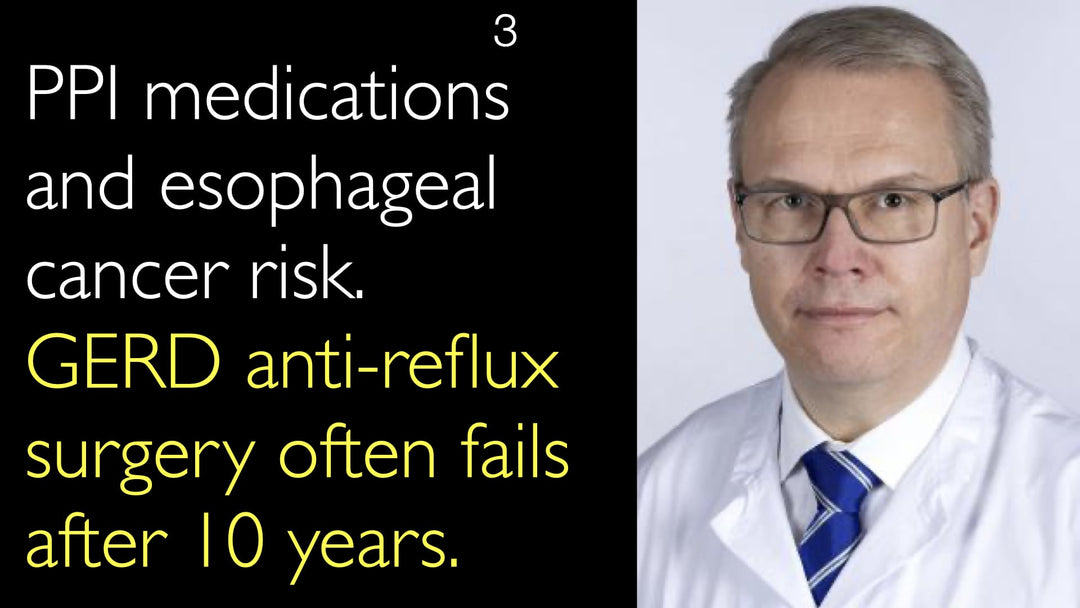逆流性食道炎手術の世界的権威、ヤリ・ラサーネン医師(医学博士)が、GERD手術の長期的な失敗率について解説します。噴門形成術の効果が10~15年後に低下するメカニズムを詳述し、術後も継続的な内視鏡的経過観察の重要性を論じます。また、手術成功後のプロトンポンプ阻害薬(PPI)の役割についても明確にします。本インタビューでは、コントロール不良の胃食道逆流症(GERD)が引き起こす重篤で生命を脅かす合併症についても言及しています。
胃食道逆流症に対する逆流防止手術の長期的転帰とリスク
セクションへ移動
手術の成功率と限界
逆流防止手術は、重症胃食道逆流症に対して非常に効果的な初期治療法です。Jari Rasanen医師(医学博士)は、成功した噴門形成術(fundoplication)が持続的な逆流を完全に防止できると確認しています。この外科的処置は、胃酸が食道へ逆流するのを防ぐ弁機構を形成します。
しかし、Rasanen医師の研究は重要な長期的限界を明らかにしています。噴門形成術で形成された外科的フラップは、時間の経過とともに緩むことが多いです。この機械的障害は通常、初回手術から10~15年後に発生します。患者は1回の逆流防止手術が生涯持続することを期待できません。本手術の有効性の最大保証期間は約15~20年です。
術後のPPI(プロトンポンプ阻害薬)療法
プロトンポンプ阻害薬(PPI)は外科的治療後において異なる役割を果たします。Jari Rasanen医師(医学博士)は、逆流防止手術が完全に成功した場合、PPIは追加的な利益をもたらさないと説明します。正常に機能する噴門形成術は、継続的な酸抑制療法の必要性を排除します。
Anton Titov医師(医学博士)との対談は、重要な臨床的区別を強調しています。手術が完全に機能する場合、薬物療法と外科的介入は相乗効果を持ちません。患者は成功した手術後に自動的にPPI療法を継続すべきではありません。このアプローチは、不必要な長期的薬物使用とその潜在的な副作用を回避します。
内視鏡的がんサーベイランス
あらゆるGERD治療後には定期的な内視鏡的モニタリングが不可欠です。Jari Rasanen医師(医学博士)は、上部消化管内視鏡検査と胃カメラ検査の決定的な重要性を強調します。このサーベイランス戦略は、医師が食道がんの発症に対して一歩先を行くことを可能にします。
内視鏡検査は、異形成として知られる前がん病変の早期発見を可能にします。食道粘膜における異形成の同定は、積極的な介入を可能にします。医師はこれらの異常細胞が浸潤性腺がんに進行する前に治療できます。この警戒的なモニタリングは、治療法に関わらず、長期的GERD管理の基盤です。
生命を脅かすGERD合併症
未治療または不十分に管理された胃食道逆流症は致命的な結果をもたらす可能性があります。Jari Rasanen医師(医学博士)は、酸性胃逆流が食道組織に対して毒性を持つことを説明します。この慢性的な刺激は、食道粘膜に深い潰瘍を形成する可能性があります。
これらの潰瘍は重篤な医療緊急事態を表します。重症例では、食道壁の完全穿孔に進行する可能性があります。食道穿孔により胃内容物が胸腔へ漏出します。この状態は重篤な感染症を引き起こし、死亡を防ぐために即時の外科的介入を必要とします。
逆流性誤嚥と肺炎
GERDのもう一つの致死的合併症は肺誤嚥を含みます。Jari Rasanen医師(医学博士)は、胃逆流がどのように肺へ移動するかを説明します。これは胃内容物が喉へ逆流し、その後吸入されるときに発生します。
酸性胃内容物の誤嚥は重度の肺炎症を引き起こします。この状態は誤嚥性肺炎として知られ、特に危険でしばしば致命的です。Anton Titov医師(医学博士)とのインタビューは、GERDが単なる生活の質の問題ではないことを強調しています。この疾患は、がん性および非がん性合併症の両方を通じて真の死亡リスクをもたらします。
全文書き起こし
Anton Titov医師(医学博士): 逆流防止手術後に食道粘膜に炎症が認められた場合、PPI阻害薬やその他の薬剤は有効ですか?胃食道逆流症の患者において、たとえ成功裏に治療された場合でも、炎症およびそれに伴う食道癌のリスクを減少させることができますか?
Jari Rasanen医師(医学博士): 逆流防止手術が成功した場合、持続的な逆流を完全に防止します。これによりPPI薬剤は追加的な効果をもたらしません。つまり基本的に、逆流防止手術だけで十分です。
患者に必要な唯一のことは、上部消化管内視鏡検査と胃カメラ検査による経過観察です。これにより、私たちはがんに対して一歩先を行くことができます。
粘膜に異形成の兆候が認められた場合、それががんに進行する前に対処できます。これは非常に重要なことです。
あなたの発表の一つで、逆流防止手術後数年経った患者を調査した際、胃食道逆流防止手術の期待された結果がもはや得られていないことを発見したと述べられています。これが問題の一つです。
初期段階では逆流防止手術は非常に成功しますが、時間の経過(約10~15年後)とともに、噴門形成術後に形成されたフラップが緩むことが非常に一般的です。
これにより、もはや逆流を防止できなくなります。つまり基本的に、逆流防止手術を受ける人に対して、それが生涯持続すると言うことはできません。
せいぜい15年、最大20年の保証しかできません。その後は、初期に成功した手術を受けていたとしても、依然として逆流が発生する可能性があります。
Anton Titov医師(医学博士): 胃食道逆流症は一般的ですが、死亡原因にもなり得ます。なぜ、どのようにして人々は胃食道逆流症で死亡するのですか?あなたはその主題について重要な研究を発表されています。
Jari Rasanen医師(医学博士): 胃逆流そのものが食道粘膜に対して毒性があります。特に逆流が酸性の場合、食道粘膜に潰瘍を引き起こす可能性があることを意味します。これらの潰瘍は食道穿孔に至ることさえあります。
これは確かに患者にとって非常に危険な状況です。
Anton Titov医師(医学博士): 胃逆流がある場合、その逆流液が肺に到達することがあります。誤嚥性肺炎を発症する可能性があり、これも非常に致命的です。
Jari Rasanen医師(医学博士): したがって、これらの要因はがん以外にも患者にとって非常に有害となり得ます。




